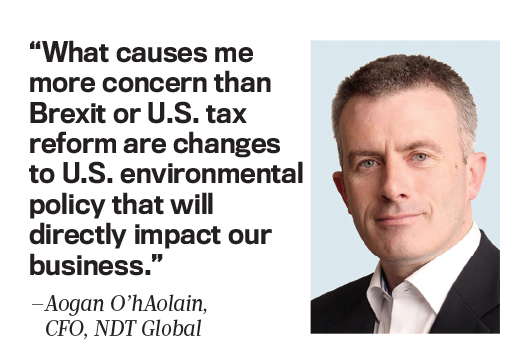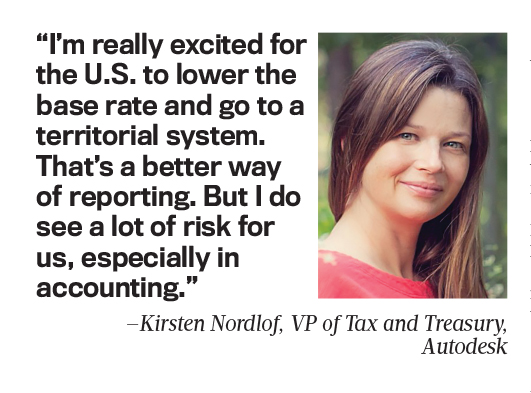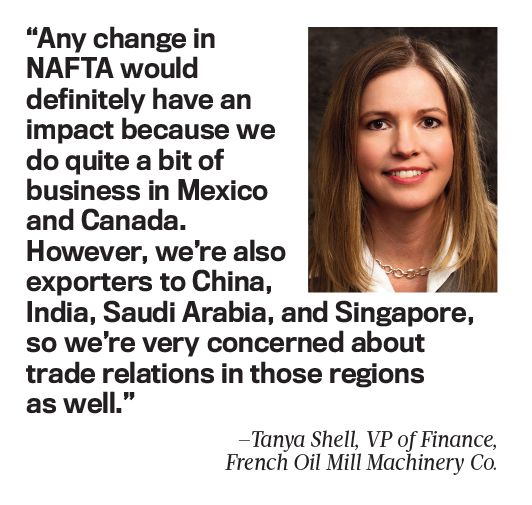Organisation for Economic Co-operation and Development (OECD) predictions show year-over-year increases in world gross domestic product (GDP) of 3.7%, up slightly (0.1%) from last year. The outlook for the G20 overall is in the same territory, while China and India will continue to power on at rates of 6.6% and 7.0%, respectively. In contrast, growth in the Euro area (Germany, France, and Italy) and the United Kingdom is expected to slow in the coming months to a projected 2.1% and 1.2%, respectively, while the United States, which has passed major tax reform, will chug along at a rate of 2.5%.
In the Euro area, despite sluggish growth, the unemployment rate fell to 9.1% in July 2017, the lowest rate since 2009, according to an OECD interim economic outlook report issued in September 2017, “Short-term momentum: Will it be sustained?” The OECD attributes this lower rate to stronger consumption and investing in the region as well as healthy export growth. In Germany, growth in the first half of 2017 was stronger than anticipated, business confidence is strong, and investment in machinery and equipment has gathered pace. In the U.K., however, GDP growth is facing headwinds due to uncertainty over the outcome of Brexit negotiations, which I’ll talk more about later on.
In the U.S., growth in 2018 is expected to be supported by more robust consumer spending and business investment, followed by stronger pay and lower wage inflation, meaning Americans’ dollars will go further. Yet when it comes to the impact of fiscal easing and regulatory reform on the U.S. economy, it’s anybody’s guess—although, domestically, businesses are reportedly very optimistic.
Canada was the winner of the growth race among members of the G7 in 2017, leading with a 3.2% year-over-year increase in real GDP fueled by strong consumer demand (housing, most notably) and a robust auto sector. But the hoopla may be short-lived: Canada’s growth prospects are expected to moderate in 2018, keeping pace with the U.S., its major trading partner to the south.
That’s the big-picture story for 2018. But against this backdrop lies a complex subtext resulting in a broad range of strategy scenarios for senior finance executives and a variety of important issues that will be keeping them up at night. Nevertheless, what the main concerns are for the coming year depends on which person you ask.
GLOBAL CONFIDENCE IS RISING
The most recent Global Economic Conditions Survey (GECS), carried out jointly by ACCA (Association of Chartered Certified Accountants) and IMA® (Institute of Management Accountants), provides some answers. (The GECS is the largest regular economic survey of accountants around the world in terms of both the number of respondents and the range of economic variables it monitors.) The GECS for the fourth quarter of 2017 attracted 4,011 responses from ACCA and IMA members around the world, including more than 250 CFOs. (See http://bit.ly/2ET0dxW.)
Results show that, on the whole, accountants around the world were regaining confidence in the global economy although they weren’t bullish yet. As expected, confidence was relatively high in South Asia, Africa, and Asia Pacific, but the picture was dramatically different in the U.K. Brexit, of course, is running in the background, causing insecurity on many fronts. According to 49% of the ACCA/IMA respondents, the biggest concern for U.K. finance executives is rising costs. The pound’s falling value, which has resulted in increased import prices, is the culprit. Finance executives also believe that the risks created by Brexit far exceed the opportunities as per the third-quarter 2017 survey.
BREXIT STILL A WORRY
Companies reliant on European Union (EU) workers, such as food manufacturers, hotels, and restaurants, are expected to be hit the hardest should post-Brexit immigration restrictions come into force. In addition, with respect to new initiatives, Brexit has put the brakes on new ventures for many companies that operate in the U.K., both domestic and foreign alike, says Arif Kamal, CFO of Thomas Cooper, LLP, an international law firm specializing in trade and finance law. It has effectively “created uncertainty around borrowing requirements and is stopping people from having long-term views on capital investment strategies,” he says.
Other issues related to Brexit will force CFOs to review a wide range of management strategies going forward. For example, supply chains will have to be reconsidered to identify potential impacts of tariffs and additional customs requirements; third-party contracts may have to be renegotiated; potential tax impacts need to be assessed; and information technology (IT) infrastructures must be reviewed in the event of potential changes to data protection laws. Brexit might even affect where companies choose to locate their offices and production facilities going forward.
There’s also an ongoing debate on whether Brexit may give rise to viable investment arbitration claims against the U.K. “Public international law firms such as Volterra Fietta are at the forefront of this debate,” Kamal notes. “The U.K. government could face multibillion-pound legal claims from foreign investors if their profits suffer because of Brexit. International arbitration specialists have been advising overseas companies that if they lose access to the EU single market, they could sue the U.K. for damages under its bilateral investment treaties with their home countries.” As such, Kamal adds, “The EU’s so-called divorce bill has sparked much excitement.”
According to Aogan O’hAolain, CFO at NDT Global, a privately held firm based in Ireland that specializes in oil pipeline inspection and testing, Brexit will require many companies to maintain a very pragmatic approach to budgeting. “You need to have agility in your models,” O’hAolain explains. “Today, the budgets that we build are a short-term vision. In reality, by the time you operationalize them, many of the factors will have changed. Particularly in uncertain times it’s important for companies to be able to adapt to change and build contingencies into their budgets.”
TAX REFORM IN THE U.S.
Across the pond, confidence in the U.S. rebounded to its highest level since the beginning of 2017, largely attributed to the passing of President Trump’s tax reform package, which saw corporate tax rates fall to 21%.
On December 20, 2017, the U.S. Senate and House of Representatives passed the Tax Cut and Jobs Act, setting the 21% corporate tax rate, which is expected to become permanent for tax years after 2018. The Act also sets a one-time mandatory tax of 8% for illiquid assets and 15.5% for cash and cash equivalents. For finance executives, like Kirsten Nordlof, VP of Tax and Treasury at U.S.-based Autodesk, a leader in 3D design, engineering, and entertainment software, managing tax complexity will be an ever-evolving challenge in 2018. “I’m really excited for the U.S. to lower the base rate and go to a territorial system,” Nordlof says. “That’s a better way of reporting. But I do see a lot of risk for us, especially in accounting.”
As Nordlof explains, the main issue around implementing the new tax agenda is the planning horizon. “There’s a lot of nuance work in the tax accounting world,” she notes, “and my biggest concern is making sure that our income tax accounting processes are up to date and that we get the impacts of tax reform into our tax external SEC [Securities & Exchange Commission] reporting in a timely manner.” In Nordlof’s view, the first step to understanding the impacts of tax reform is to build a road map.
“Right now, we’re sitting down with our advisors and our teams and looking at the tax bill. There are a lot of decisions that need to be made regarding the use of tax assets to offset the mandatory repatriation tax, how intercompany transactions will be treated under the new rules,” Nordlof explains. “Then we’re mapping out where it would impact our provision in our external reporting—understanding how it impacts the deferred tax liabilities and assets, and how it impacts our tax rate forecast for guidance.”
“Documenting processes also helps as you think about tax reform,” she adds, “and gives you a really clear understanding of how your workbooks are linked and how the information should be fed into your systems.”
OTHER ISSUES ON THE HORIZON
Other aspects of the tax bill directed at multinational companies relate to base erosion and profit shifting (BEPS) through intercompany payments and tax inversions. The OECD reports that BEPS results in annual losses of anywhere from 4% to 10% of global corporate income tax (CIT) revenues—roughly US$100 billion to $240 billion annually. Most of this “missing” profit has been shown to wind up in just a few jurisdictions with near-zero effective tax rates—most notably the Netherlands, Ireland, Bermuda, Luxembourg, Singapore, and Switzerland—and, as the Paradise Papers reveal, the practice of “treaty shopping” has led many companies to incorporate in Mauritius. In the U.S., country-by-country reporting will commence for tax years beginning on or after January 1, 2017, with filing to be completed with the IRS sometime in 2018. Furthermore, on June 7, 2017, roughly 70 countries launched a new international tax convention to prevent treaty shopping, which has allowed companies and private individuals to exploit tax haven options.
In addition to recent changes to the U.S. tax system and international efforts to curb BEPS, other tax issues may be on the horizon. In its 2017 report, “The Tax Function of the Future: Building the Business Case for Change,” PwC predicts that many jurisdictions will pass laws to adopt a tax control framework that follows guidelines similar to those of the Sarbanes-Oxley Act of 2002 and COSO (Committee of Sponsoring Organizations of the Treadway Commission), and that “most global tax preparatory compliance and reporting activities, including data collection and reconciliations, will be performed within the company’s shared service center or will be co-sourced with a third party.” The Big 4 firm also envisages that corporate tax functions will use real-time collaboration tools to automate their workflow, document management, calendaring, and internal controls. Ultimately, the report says, “More companies will use their enterprise-wide financial systems to prepare tax calculations, thereby replacing spreadsheets and/or traditional tax technology solutions.”
MANAGING UNDER UNCERTAINTY
Managing tax complexity over the coming months will be the main concern for some CFOs. For others, it will be managing under uncertainty. For instance, companies such as privately held ESCO Group, operating in the agricultural heartland of the U.S. Midwest, are worried about the fate of NAFTA (North American Free Trade Agreement).
As ESCO CFO Rachel Saunders explains, her company relies on the U.S. agricultural sector for most of its business, which involves the provision of plant automation systems and electrical construction services. “Our growth has been solid over the past number of years, as most of our clients are building new plants or building control systems for their lines,” she says. NAFTA offered some shielding on pricing between the U.S., Canada, and Mexico, she explains, so if NAFTA goes away, that’s going to upset the agricultural areas.
“If the larger corporations can’t get the pricing they’ve been used to in North America, they’re likely to spend a lot less on capital expenditures, which is our biggest concern,” Saunders adds.
Similarly, the trade environment is central to the success of French Oil Mill Machinery Co. based in Piqua, Ohio. French is a family-owned company that, among other services, custom designs, manufactures, and supports hydraulic presses for molding rubber and composite materials. “Any change in NAFTA would definitely have an impact because we do quite a bit of business in Mexico and Canada,” says Tanya Shell, French’s VP of Finance. “However, we’re also exporters to China, India, Saudi Arabia, and Singapore, so we’re very concerned about trade relations in those regions as well.”
But for energy-related companies like NDT Global, the greater risk is the evolving regulatory agenda in the U.S. Because the U.S. is one of their three major markets, “what causes me more concern than Brexit or U.S. tax reform are changes to U.S. environmental policy that will directly impact our business,” O’hAolain notes. “Regulatory changes have a big impact on the maintenance program of a lot of the companies that we deal with, and while the U.S. tends to be more regulated than other regions, we’re concerned that the momentum has been lost for driving a greater amount of accountability and reporting in this area.”
CREEPING CONCERNS
In 2018, several other issues will impact all U.S. companies, namely the availability of enough talent to meet their growth potential, emerging and growing security risks, and advances in technology that can dramatically change financial management for years to come.
For instance, in terms of finding talent, trade schools aren’t as popular as college for high school kids once they graduate. “It’s really tough to get them into apprenticeship programs and grow them into journeymen and foremen,” Saunders explains. “So we’re running into a shortage in certain areas. We have some very key people who are excellent, but the question is whether they have the time to mentor, to basically grow people into those types of roles.”
That’s a headache that French’s Tanya Shell can relate to. “Finding skilled manufacturing labor and skilled machinists has been an ongoing challenge, especially people who know how to use some of the older equipment,” she says. “A lot of the people that know how to use the older machinery are approaching retirement. We also have new machinery, so we’re actively looking for younger people who are willing to take on an apprenticeship in a highly specialized industrial company.”
Finding the right people with the right skills applies to IT as well, especially to help combat the constant threat of cyberattacks. Specifically, experts are encouraging finance chiefs to step up their game when it comes to cybersecurity, pointing to rapid advancements and investments in new technologies that may pose unprecedented and unforeseen risks. Earlier in 2017, the Information Security Forum released its latest research on nine major threats CFOs should be aware of over the next two to three years as a result of technology changes. The three major areas of concern are disruption from an overreliance on fragile connectivity, distortion as trust in the integrity of information is lost, and deterioration when controls are eroded by regulations and technological change, such as when companies rush to deploy artificial intelligence with unexpected outcomes. (For more, see “Threat Horizon 2019: Disruption. Distortion. Deterioration.” at http://bit.ly/2mShJMd.)
All these threats are likely to keep CFOs tossing and turning in 2018.
THE IMPACT OF BLOCKCHAIN TECHNOLOGY
Meanwhile, blockchain technology—a global digital ledger of economic transactions that’s transparent, continually updated by countless users, and almost entirely secure from cyberattacks—is promising a sea change in financial management. According to EY, “Advanced financial applications are in development now, and global systems that could revolutionize traditional finance operations will be implemented in the coming year.”
ACCA reports that those industries that will benefit the most are ones that have a large amount of manual processing or legacy systems or that rely heavily on outdated and/or offline modes of working. For importers/exporters specifically, the digital ledger would contain the contract, letter of credit, shipping receipt, and regulatory documentation for customs and insurance. For management, the digital ledger removes multiple, disjointed internal and external databases of records that need reconciling—and should reduce the risk of inadvertently missing transactions through timing mismatches or booking errors. And for the accountant, digital ledgers would help transaction-level data to be compiled, checked, or reconciled. Ultimately, ACCA says, “Blockchain presents new areas for analysis and consideration, and the sooner professional accountants increase their awareness, the better prepared they will be to engage with it.”
New challenges around compliance, process, and data requirements will demand that many CFOs overhaul their tax functions while evaluating the role of Big Data and artificial intelligence in tax planning. System improvements will need to be made to ensure a seamless flow of information between business units, functions, and managers, while CFOs will be looking to best practices in automation and internal controls that will help reduce tax risk in 2018 and beyond.
©2018 by Ramona Dzinkowski. For copies and reprints, contact the author.

February 2018









